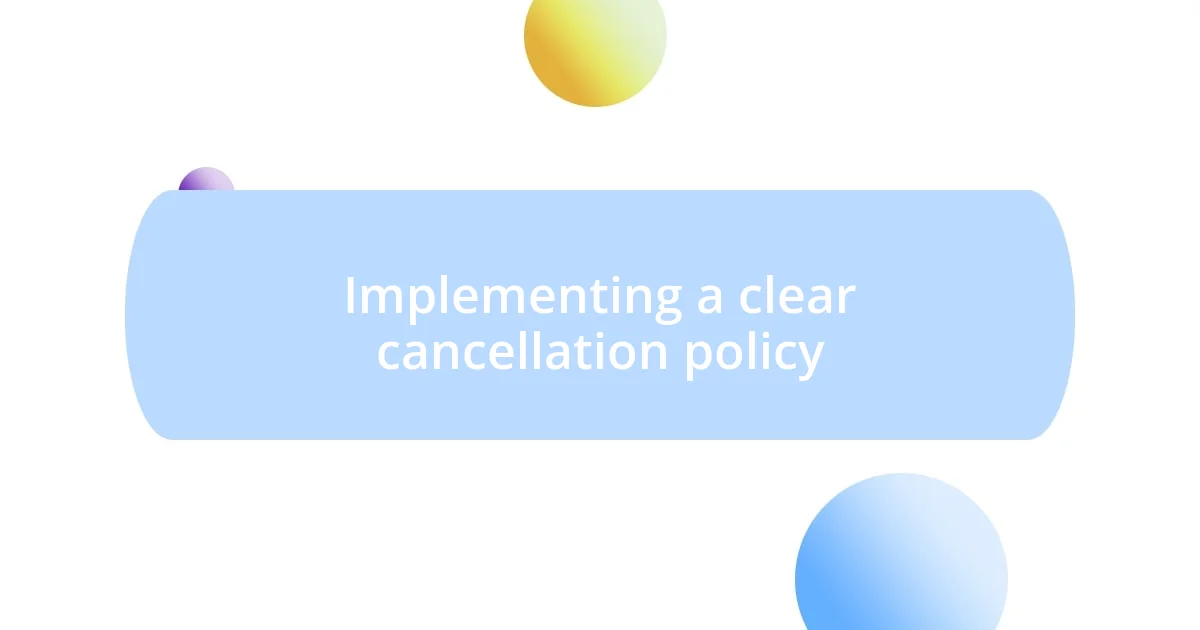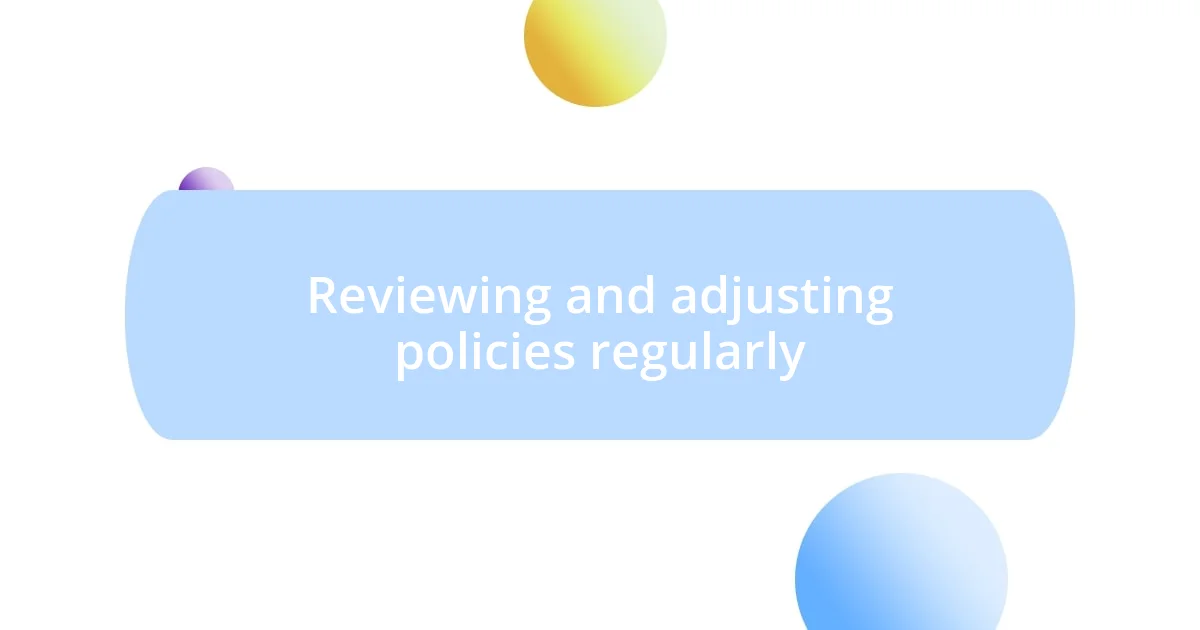Key takeaways:
- Understanding the reasons behind hotel cancellations (e.g., emergencies, financial issues, weather) is crucial for improving guest relations and responding empathetically.
- Implementing clear and flexible cancellation policies fosters trust and improves communication with guests, creating a positive experience even during cancellations.
- Regularly reviewing and adjusting cancellation policies based on guest feedback and industry trends can enhance guest satisfaction and reduce booking frustrations.

Understanding hotel cancellations
Understanding hotel cancellations can be a complex topic, and I’ve definitely felt the weight of that complexity in my experience. It’s surprising how quickly a reservation can turn from a joyous anticipation into a last-minute scramble. Have you ever faced the frustration of a guest canceling just a day before their stay? It can feel like a personal slight, but really, it’s often just a result of life’s unpredictability.
When I first started in the hospitality industry, I remember a particular weekend when several guests canceled due to unexpected weather. It opened my eyes to how external factors—like a storm or a pandemic—can dramatically impact hotel cancellations. It’s not just about numbers; each cancellation often comes with a story, and understanding that can transform how we measure success in our bookings.
Moreover, not all cancellations are created equal. Some guests might have non-refundable rates but still choose to cancel, while others might have legitimate emergencies that warrant flexibility. Thinking about these different scenarios made me realize that compassion is just as important as policy in this business. After all, isn’t our goal to understand and serve our guests, even when plans change?

Reasons for hotel cancellations
Every time a guest cancels, there’s usually a specific reason behind it. I’ve often found that understanding these reasons is crucial for managing expectations and improving guest relations. For instance, life changes rapidly, and what seems like a sure plan today can become impossible tomorrow.
Here are some common reasons for hotel cancellations:
- Unexpected emergencies: Family issues or personal health crises that arise suddenly can force guests to rethink their travel plans.
- Financial constraints: Occasionally, people realize they may not afford their trip due to unexpected expenses.
- Weather conditions: I vividly remember a group who canceled their long-planned ski trip due to an unseasonably warm forecast. The disappointment was palpable, both for them and for us.
- Pandemic-related concerns: In recent years, fears around health and safety have led to increased cancellations, even from guests who previously booked.
- Change in travel plans: Flights can be delayed, or meetings can be rescheduled, leaving guests little choice but to cancel their hotel stays.
Each reason reflects a story, often intertwined with emotions that can feel reminiscent of my own experiences in the industry. For example, I can still recall a couple who couldn’t make their anniversary trip due to a last-minute work obligation. They were devastated, and their disappointment reminded me of how crucial it is to approach each cancellation with empathy.

Implementing a clear cancellation policy
Implementing a clear cancellation policy is vital for managing expectations and fostering trust with guests. I recall developing a cancellation policy that was transparent and accessible; it made a noticeable difference in the way guests interacted with our hotel. I often advise that clarity is key—when guests understand the terms upfront, it reduces confusion and dissatisfaction when cancellations do occur.
In my experience, a well-communicated policy not only sets the tone for transactions but also reflects a hotel’s commitment to customer service. I once had a guest express their appreciation for how straightforward our cancellation terms were, especially during a time of personal uncertainty. This openness created a bond that went beyond just the booking—it laid the foundation for trust.
By distinguishing between flexible and non-refundable rates in the policy, I’ve found we cater to different guest needs. This approach can help guests feel they have options during unforeseen circumstances. For example, I had a family once who opted for a flexible rate; they later expressed relief when they had to change their travel plans, thanks to the clear options presented to them. Good policy is more than rules; it’s about providing a safety net for guests.
| Policy Type | Guest Communication |
|---|---|
| Flexible | Allows changes up to a certain date; promotes trust. |
| Non-refundable | Discounted rates; encourages commitment but may cause frustration. |

Communicating with guests effectively
Effective communication with guests is essential during cancellations. I’ve learned that a simple, heartfelt message can make a significant impact. For instance, I once reached out to a guest who had to cancel due to a family emergency. Their gratitude for the personal touch reminded me that sometimes it’s not just about the cancellation; it’s about how we make the guests feel cared for during tough times.
I try to use multiple channels to communicate updates—whether through email, phone calls, or text messages. One memorable experience involved a guest who had questions about their cancellation status late at night. I quickly responded via text, reassuring them and alleviating their worries. It’s moments like these that reinforce the importance of being readily available and responsive.
I always ask myself, “How would I feel in their shoes?” This perspective helps me craft messages that resonate. By acknowledging their feelings and providing information clearly and kindly, I’ve found we can maintain a positive relationship even through cancellations. After all, effective communication is about creating understanding and building trust, which can lead to future bookings despite the current situation.

Managing cancellations through technology
Managing cancellations is increasingly becoming a tech-driven process, and I’ve found that leveraging the right tools can make all the difference. For instance, I integrated a property management system that automatically sends cancellation confirmations and policy reminders. This not only reduces my workload but also provides guests with immediate clarity about their situation. Can you imagine the relief a traveler feels when they receive a timely acknowledgement of their cancellation?
Moreover, utilizing chatbots for initial inquiries has streamlined our communication significantly. I remember a time when a guest opted for a last-minute cancellation, and the chatbot was able to guide them through the process while I was busy assisting other clients. It amazed me how a simple tech solution could improve efficiency and ensure guests didn’t feel neglected. This blend of technology and personal touch has really elevated the guest experience—I often ask myself, how can we make the process as painless as possible for our guests?
On the data side, analytics tools have been invaluable for understanding cancellation trends. I found that by tracking data on cancellations, I could identify specific times of year when cancellations spiked. This insight helped me adjust our promotional strategies accordingly. Isn’t it fascinating how technology not only assists in managing current situations but also paves the way for better future planning? Embracing technology for cancellations has become a strategy I can’t imagine being without.

Offering alternatives to cancellation
Offering alternatives to cancellation can really help maintain a positive relationship with guests. I once had a guest who was facing a sudden job relocation and needed to cancel their trip. Instead of just processing the cancellation, I offered them a complimentary future stay at a later date. The relief in their voice was palpable, and they expressed a sense of gratitude that transformed a frustrating situation into a hopeful one. It’s reminders like this that reinforce why providing alternatives is crucial.
Incorporating flexible options is something I’ve made standard practice. When cancellations happen, I proactively present options like rescheduling or even moving their reservation to a different property in our chain that might better suit their needs. During one particularly busy summer, a guest planned to visit for a wedding but had to cancel last minute due to a scheduling conflict. By offering to switch their reservation to a more convenient location for their new travel plans, I was able to not only save their vacation but also create a loyal customer in the process. Doesn’t it feel great to turn what could have been a negative experience into a positive interaction?
Additionally, I always encourage guests to consider gift vouchers for future use. This has worked wonders in my experience! A couple once had to cancel their honeymoon due to unforeseen circumstances. By offering them a voucher, not only did they find some comfort in knowing they could still enjoy their planned getaway later, but it also kept that personal connection alive. It’s moments like these that remind me of the power of empathy in hospitality—making each guest feel valued, no matter the situation, fosters a lasting rapport that can lead to future bookings.

Reviewing and adjusting policies regularly
Regularly reviewing and adjusting my cancellation policies has proven essential for maintaining guest satisfaction and business viability. For example, I recall a time when I decided to revisit my existing policy after noticing an uptick in cancellations during holiday seasons. By allowing more flexible cancellation terms for that period, I not only decreased the frustration of last-minute changes but also saw an increase in bookings as guests felt more secure in their reservations. Isn’t it fascinating how small tweaks can lead to significant improvements in guest trust?
I’ve also learned that involving my team in these reviews is crucial. During our last meeting, we discussed real-life scenarios from the front desk that revealed gaps in our policy communication. One teammate shared an instance where a guest felt misinformed about a non-refundable charge. This feedback prompted us to add clearer explanations to our website, which reduced confusion and streamlined our processes. Have you ever considered how a simple team discussion can lead to impactful changes?
Additionally, keeping an eye on industry trends is equally important. I remember attending a hospitality conference where a speaker remarked about shifting consumer expectations towards greater transparency. It struck me that I needed to adapt promptly to these changes. By regularly updating my policies to reflect current trends and insights from guests, I’ve cultivated an environment of trust and loyalty. It reinforces my belief that a proactive approach not only enhances operations but also strengthens guest relationships—don’t we all crave that sense of understanding and reliability?














